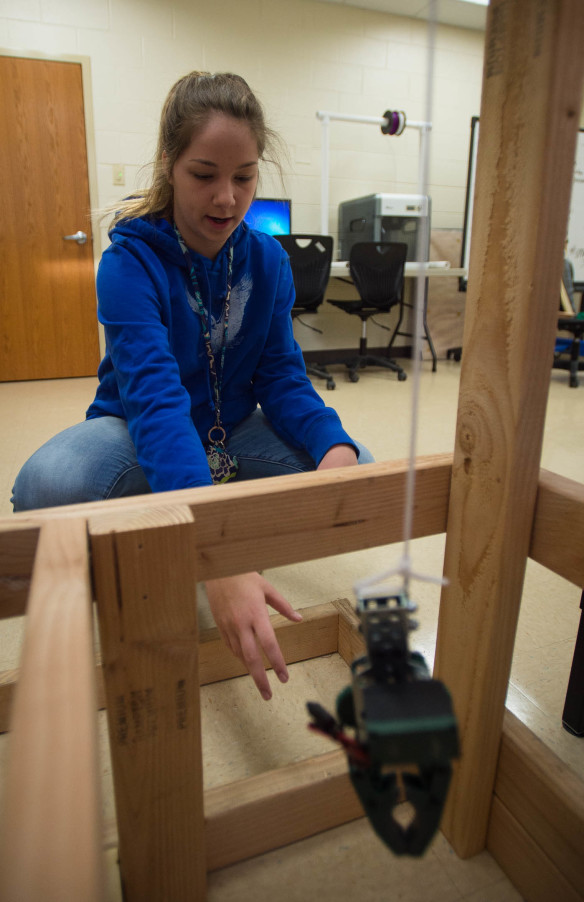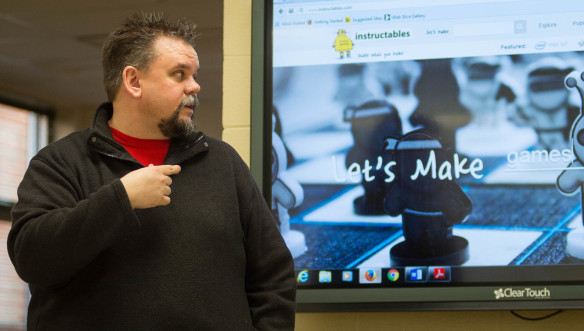
Trinity Brown, an 8th-grader at Robert D. Campbell Junior High School in Clark County, designed and built a claw machine as her passion project in John Chaney’s Innovation Lab. Students in the class get to spend nine weeks working a project of their choosing.
Photo by Bobby Ellis, March 23, 2016
By Brenna R. Kelly
Brenna.kelly@education.ky.gov
It doesn’t take long for the students filing into John Chaney’s classroom to figure out something is different there. It’s not just the Star Wars posters on the walls or the basketball goals in the corner – although each might have something to do with it.
“I want you to find your passion,” Chaney tells the 7th-graders as they sit down at computers. “What is it that you like to do? Look in that area and come up with some projects.”
This is the Innovation Lab at Robert D. Campbell Junior High. During the 9-week class, students at the Clark County school will decided what he or she will learn. Students could create a product, write a book, build a website, app or something completely different.
The final grade, Chaney tells his students, won’t be based on whether their creation works – or even whether it’s finished.
“This is about how passionate you are,” he says, “how you problem solve and think critically about what you are doing.”
Chaney, who has been a technology teacher for 20 years, started the class last spring after realizing his standard classes weren’t inspiring all students.

John Chaney shows the website Instructables to his 7th-grade Innovation Lab students. Students can use the website to find project ideas and how-to guides.
Photo by Bobby Ellis, March 23, 2016
“What I saw was that when I taught robotics or modeling, I had a group of kids who were really into that, but then you had another group of kids who were like, ‘This means nothing to me,’” he said. “I knew that I wasn’t reaching everybody, so I just kind of came up with the idea that, let’s give them an hour to work on something they want to work on.”
Some schools call it the Genius Hour, time set aside for students to choose what they learn. The concept stems from Google’s 20 percent time policy, in which the tech company allows its employees to spend 20 percent of their time working on their own ideas.
More and more schools across the country are embracing the idea as a way to increase student-led learning, said Don Wettrick, who started an innovation class at his Noblesville, Ind., high school about five years ago and has written a book on the topic.
“We’re teaching them how to think,” he said. “When a teacher lays out a lesson for you, it’s already set.”
But with passion projects, students have decide what they want to learn, then devise a plan to learn it and are held accountable for following the plan. It teaches students to break up large tasks into smaller chunks, he said.
Wettrick, who also hosts an innovation podcast and was named 2015 Indiana Innovator of the Year, has helped about 15 schools across the country start similar programs and has worked with Chaney on his middle school class. The number of schools trying some version of genius hour is growing by the day, he said.
Clark County’s innovation program already is expanding to the district’s alternative school thanks to a $9,400 grant from The Greater Clark Foundation. Chaney doesn’t plan on stopping there.
“My goal is to eventually get Innovation Labs across Kentucky,” Chaney said.
In the Robert D. Clark lab, students weren’t sure at first whether to believe Chaney when he told them they could choose what to learn.
“It’s taken a week to a week and a half just to get them to understand that I’m not lying, that they really do their own thing,” he said. Now that more students have taken the class, about 750 so far, word has gotten around the school that this is the real deal.
Though students get to choose their projects, the class is not a free-for-all. Students must write a proposal, present it to the class, find a mentor, identify the academic standards they will learn and then research and develop the project. At the end of the nine weeks, students must give a TED-style talk explaining what they have learned.
Projects have included building a 3-D printer, a claw machine, an Etch-E-Sketch programmed with a computer, an automatic return basketball goal, an aluminum foundry and a self-cleaning paint brush.
As the students work, they inevitably turn to Chaney when they run into problems.
“I tell them, ‘Figure it out,’” he said. “At this level, they’ve got to learn how to problem solve, how to think critically and work through problems and know that they can do it.”
And sometimes they’ve got to fail, he said.
“I’ll tell them I want them to fail in here, and they look at my like I’m crazy, but I tell them, that’s how you grow as a learner,” Chaney said.
That was a new concept for 8th-grader Jakob Sponcil. Sponcil and two classmates designed an airbag alternative – a harness that would fall from the roof of a car on impact and restrain a driver.
They designed and printed parts with the 3-D printer and used an office chair as the car seat.
But some of their design didn’t work as planned, and the welds Sponcil made to rebar didn’t hold. The group could not finish the project by the end of the class.
“I learned that it’s OK to fail,” Sponcil said. “You can do everything perfect and spend as much time as you can, but it’s OK to fail. In other classes, failure is not an option. On a test, you want to get a good grade. In here, even though we didn’t get finished, we didn’t fail.”
In fact, the group got a B, he said.
Grades aren’t what’s important to Chaney – and he worries that students who usually make all As and Bs won’t take on a challenging project for fear of not getting a high grade. On the other hand, students who aren’t typically high achievers may tackle something that gets them an A.
“I don’t care about grades, as long as students come in here and problem solve, work with each other and are passionate about what they are doing,” he said. “If they fail at something, if it’s not successful, that’s OK, they don’t fail the class.”
While the students do learn about the content of their specific project, Chaney believes the biggest benefit of his class teaching students the 21st century skills of communication, critical thinking, creativity and collaboration.
Eighth-grader Trinity Brown, who designed the claw machine, said she didn’t think of herself as creative until she landed in the Innovation Lab.
“I’m extremely good at woodworking and a bunch of outdoorsy things I was never into before,” she said.
And Brown may even have found her career calling. After being in one of the first labs at the school, she now serves as a mentor to the 7th-grade classes and is thinking about becoming a teacher.
“I love to teach, I love kids, I love making stuff fun for them,” she said. “If we could get this program teaching more subjects and students were able to do their own thing, I think we could change education.”
MORE INFO…
John Chaney John.Chaney@clark.kyschools.us
Don Wettrick Donald_Wettrick@nobl.ky12.in.us
Twitter: Follow #rdcinnovations #geniushour






Leave A Comment